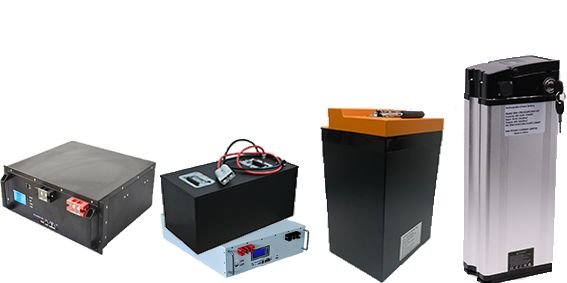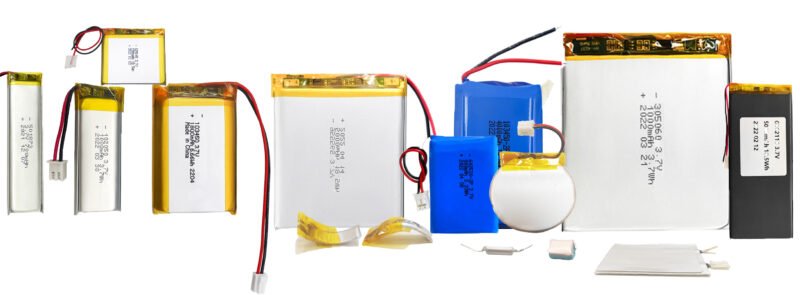Which one is Best? LiFePO4 or Li-ion or Li-Po?
It’s difficult to say which battery chemistry is “best”. Because each type of lithium battery (LiFePO4, Li-ion, and Li-Po) has its own unique advantages and disadvantages, and the best choice depends on the specific application and requirements. Here’s a brief overview of each type:
LiFePO4:This type of lithium battery is known for its long cycle life, high power density, and excellent thermal stability. LiFePO4 batteries are also relatively safe and less prone to thermal runaway, making them a popular choice for applications where safety is a top concern, such as electric vehicles and energy storage systems. However, LiFePO4 batteries have a lower energy density compared to other lithium battery chemistry, which means they are bulkier and heavier for the same energy capacity.

Li-ion: This is a general term for a range of lithium battery chemistry that use a lithium cobalt oxide cathode. Li-ion batteries are known for their high energy density, making them a popular choice for portable electronic devices such as smartphones and laptops. However, they have a shorter lifespan compared to LiFePO4 batteries, and they are more prone to thermal runaway if they are damaged or overheated.

Li-Po: This type of lithium battery is known for its high energy density, which makes it a popular choice for drones and other unmanned aerial vehicles (UAVs). LiPo batteries are also relatively lightweight and can be made in a variety of shapes and sizes. However, they are more prone to swelling and fires compared to other lithium battery chemistry, and they require careful handling and storage to prevent damage.

Overall, each type of lithium battery has its own unique advantages and disadvantages, and the best choice depends on the specific application and requirements.
Li-Po VS Li-ion VS LiFePO4
Li-Po (Lithium Polymer), Li-ion (Lithium Ion), and LiFePO4 (Lithium Iron Phosphate) batteries are all types of rechargeable lithium-ion batteries, but they have some important differences.
Chemistry: Li-Po and Li-ion batteries use different types of lithium-ion chemistry, while LiFePO4 batteries use lithium iron phosphate as the cathode material.
Energy Density: Li-Po batteries typically have the highest energy density, which means they can store more power in a smaller space. Li-ion batteries have a slightly lower energy density, while LiFePO4 batteries have the lowest energy density of the three.
Safety: LiFePO4 batteries are considered to be the safest of the three, as they are less prone to thermal runaway and overheating than Li-Po and Li-ion batteries.
Cycle Life: LiFePO4 batteries typically have a longer cycle life than Li-Po and Li-ion batteries, meaning that they can be charged and discharged more times before they need to be replaced.
Cost: LiFePO4 batteries are typically more expensive than Li-Po and Li-ion batteries.
In general, Li-Po batteries are often used in applications where high energy density is important, such as in drones or RC vehicles, while LiFePO4 batteries are often used in applications where safety and longevity are the primary concerns, such as in electric vehicles or renewable energy storage systems. Li-ion batteries are used in a wide variety of applications, from laptops and smartphones to electric cars and power tools.
More specific about advantages and disadvantages of LiFePO4 battery
Here are some more specific advantages and disadvantages of LiFePO4 batteries:
Advantages:
Long cycle life: LiFePO4 batteries can last up to 10 times longer than lead-acid batteries and have a typical lifespan of several thousand cycles. This makes them a cost-effective option over the long term, particularly for applications where the battery is cycled frequently.
High power density: LiFePO4 batteries have a high power density, which means they can deliver a lot of power quickly. This makes them suitable for high-power applications such as electric vehicles, power tools, and renewable energy systems.
Excellent thermal stability: LiFePO4 batteries are less prone to thermal runaway than other lithium-ion battery chemistry, making them a safer option. They can also operate in a wider range of temperatures without suffering from performance degradation.
Low self-discharge rate: LiFePO4 batteries have a low self-discharge rate, which means they can hold their charge for longer periods of time without needing to be recharged. This makes them suitable for backup power and energy storage applications.
Environmentally friendly: LiFePO4 batteries are considered to be more environmentally friendly than other types of batteries because they do not contain toxic heavy metals such as lead or cadmium.
Disadvantages:
Lower energy density: LiFePO4 batteries have a lower energy density compared to other lithium-ion battery chemistry, which means they are bulkier and heavier for the same energy capacity. This can make them less suitable for applications where weight and space are a concern.
Higher cost: LiFePO4 batteries are generally more expensive than lead-acid batteries and other lithium-ion battery chemistry, which can make them less cost-effective for some applications.
Limited charging rate: LiFePO4 batteries have a limited charging rate compared to other lithium-ion battery chemistry, which means they take longer to charge.
Lower voltage: LiFePO4 batteries have a lower nominal voltage compared to other lithium-ion battery chemistry, which means they may not be compatible with some devices or systems that require a higher voltage.
Overall, LiFePO4 batteries have several advantages that make them suitable for a range of applications, particularly those where safety and long cycle life are a concern. However, their lower energy density and higher cost may make them less suitable for some applications where weight, space, and cost are a primary concern.
Prev Article: The Lowest Temperature for a Lithium Battery to Operate
Next Article: Cost Analysis of New EV Lithium Power Batteries in 2023



Thanks for the understandable, well written article. Very helpful.
I agree. Excellent article. My only question: do they require different chargers or will one charger work for all three?
different charger, as voltage is not the same